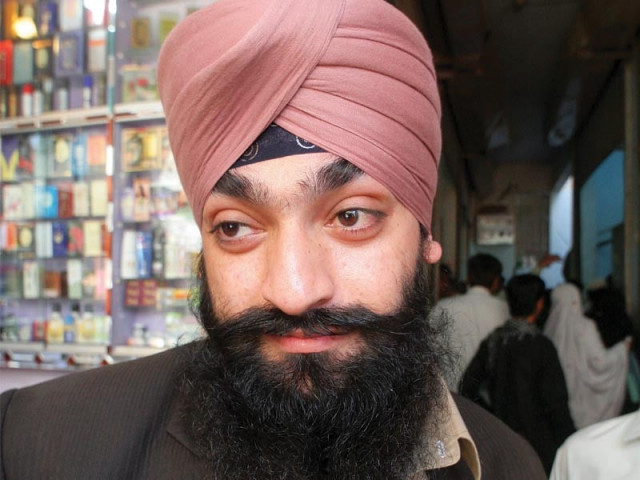Starting over: In a violent city, migrating Sikhs find peace
Pashto-speaking Sikh families leave Khyber Agency due to worsening conditions post 9/11.

Pashto-speaking Sikh families leave Khyber Agency due to worsening conditions post 9/11.
Known as a city of migrants, Karachi and its inhabitants are not usually considered the most welcoming hosts but for Hakeem Sardar Manmoon Singh Peshawari, a Pashto-speaking Sikh from the Khyber Agency, it has become home to his family and practice.
The young hakeem from valley Tirah spends his Wednesdays at the Hakeem Peshawari’s clinic at Masan Chowk - a Pashtun area near Karachi port - prescribing medicines to a growing line of patients.
The clinic at Masan Chowk is one of many - with education in herbal medicine from Peshawar, the hakeem now attends to around 1,200 patients visiting his clinics in different areas of the city. “I make Rs50 from one patient,” said Peshawari. “People from all communities and religions visit my clinics.”
He is among the few Pashto-speaking Sikhs in the city who migrated from Khyber Agency due to the worsening situation in Afghanistan and surrounding tribal areas after the 9/11 attacks in 2001.
“I was in Kabul in late 2001 but it became impossible to live there. That is when I moved to Karachi and opened a private clinic in Hub,” explained Peshawari. “Later, I shifted to Clifton.”
Apart from his nine family members who live with him in Karachi, the rest are in Peshawar. “We are all Pashtuns and our forefathers came from Afghanistan. We are original Sikhs and have been strictly following our religion for centuries.”
Though Peshawari and his family had to relocate from the Khyber Agency, their reasons had nothing to do with their religion. “Around 25,000 Sikhs live in Tirah and the Muslim Pashtuns there are proud of us and respect our beliefs,” Peshawari told The Express Tribune. “If we were not living in their areas, we would have left this country ages ago.”
Finding new homes
Pramjeet Singh, a 40-year old hakeem also hailing from Tirah, is another Pashto-speaking Sikh settled in Karachi. “I grew up in Tirah and my family, all Pashtuns, has been living there for centuries,” said Pramjeet, who runs his clinic in Landhi.

Despite his Pashtun background and language, he has never ever faced any problems in Karachi due to his ethnicity. “I have always been welcomed in all areas of the city - whether dominated by Urdu-speaking people or Pashto-speakers,” said Pramjeet. “I never felt any hatred towards me due to my background. I can run my clinic freely anywhere in the city.”
According to Sardar Ramesh Singh of the Pakistan Sikh Council, around 10 families of Pashto-speaking Sikhs from the Khyber Agency are now living in Karachi. “Most of these families moved to Karachi, rural Sindh and Punjab when the law and order situation in Khyber Agency deteriorated.”
Building communities
Business is the main reason why Sikhs choose to live in Karachi, Sardar Ramesh told The Express Tribune. “They visit each other and share their joys and sorrows” he said, explaining that their native language is Gurmukhi Punjabi but some of the Sikhs have adopted the language of the areas they have been living in for centuries. “Sikhs from Sindh speak Sindhi while those from FATA and Khyber Pakhtunkhwa speak Pashto.”
Pashto poet, writer and critic Prof. Dr Raj Wali Shah Khattak told The Express Tribune that although Sikhs are not Pashtuns by origin, they speak the language and share some of the cultural traits.
“I don’t think the Sikhs have roots in any of the known 3,500 Pashtun tribes,” said Khattak. “But they have been living long enough with the Pashtuns and follow parts of their culture. In my opinion, they should be acknowledged officially as Pashtun Sikhs.”
Published in The Express Tribune, February 11th, 2013.



















COMMENTS
Comments are moderated and generally will be posted if they are on-topic and not abusive.
For more information, please see our Comments FAQ